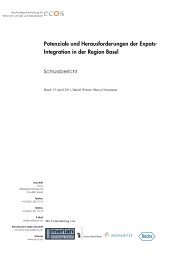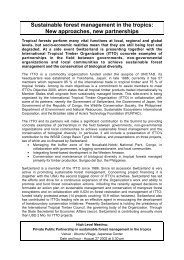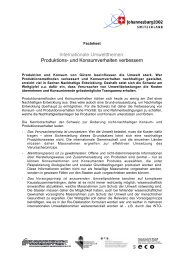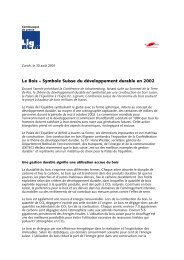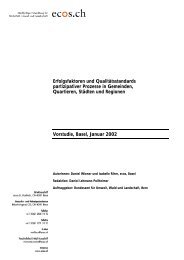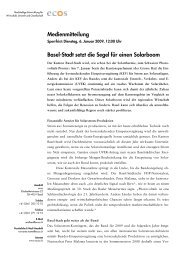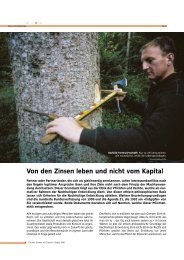Extract from the Position Paper
Extract from the Position Paper
Extract from the Position Paper
You also want an ePaper? Increase the reach of your titles
YUMPU automatically turns print PDFs into web optimized ePapers that Google loves.
WSSD 2002 - 6 -<strong>Position</strong>en der Schweiz Erarbeitungsstand 22. März 2002Mountain resources with economic value are not only developed largely as <strong>the</strong> result of externalintervention and investment, but are also exploited primarily by external interests. In most cases,compensation for use of mountain resources is inadequate. The consequences for mountainregions are lack of capital, minimal economic power, widespread poverty, degradation of naturalresources and migration.Hence Switzerland is firmly committed to adequate compensation for services provided bymountain regions to surrounding areas. This includes <strong>the</strong> streng<strong>the</strong>ning of local rights of resourceuse; fair concessions for use of mountain resources such as drinking water, water used forirrigation and hydropower, mineral resources and timber; and promotion of forms of tourism thatallow for conservation of resources and foster local economic development. Compensation mustalso be provided where it is in <strong>the</strong> general public interest to refrain <strong>from</strong> resource use, e.g. in <strong>the</strong>case of establishing nature reserves. The overall aim is to ensure that adequate income is returnedto mountain areas as part of a comprehensive arrangement in which financial resources arebalanced within closely linked highland-lowland systems.In order to relieve pressure on mountain resources, Switzerland supports efforts to promotedevelopment that conserves resources in mountains and surrounding areas. At <strong>the</strong> domestic aswell as <strong>the</strong> international level, Switzerland advocates <strong>the</strong> polluter pays principle, according to whichthose who waste or degrade resources must bear <strong>the</strong> costs.d) Diversification and <strong>the</strong> benefits of complementaritiesMost of <strong>the</strong> world’s mountain regions are areas characterised by sensitive ecosystems with littlepotential for human use. The disadvantage of limited potential for use can be partly overcomethrough diversification of resource use in different altitudinal belts and climatic zones as well as indifferent sectors such as agriculture, pastoralism and forestry; through integration of business,industry and tourism; and through seasonal migration.Accordingly, Switzerland is carefully monitoring <strong>the</strong> impacts of current global trends such asglobalisation, promotion of economies of scale, specialisation and monofunctional use, andconcentration of public services, in light of possible threats to diversification and sustainabledevelopment of mountain regions. Switzerland thus supports diversified and multifunctional formsof agriculture. It <strong>the</strong>reby acknowledges <strong>the</strong> central role of agriculture in many of <strong>the</strong> world’smountains as a local source of food, employment, income and value-added production, as well as<strong>the</strong> key role played by agriculture in ensuring decentralised settlement and maintainingbiodiversity.To streng<strong>the</strong>n <strong>the</strong> economy in mountain region, Switzerland supports <strong>the</strong> development ofopportunities to generate local income in <strong>the</strong> business, industrial and service sectors (e.g. tourism).This involves exploiting complementarities with o<strong>the</strong>r economic areas, as well as targeted supportfor mountain-specific products and services – for example, through better-quality advice andimproved access to markets, quality labelling, or <strong>the</strong> use of new information technologies.Switzerland believes it is important to integrate <strong>the</strong> business community in mountain developmentmuch more closely than previously. To fur<strong>the</strong>r this objective, it supports development ofdecentralised infrastructure – especially with respect to land development (including roads, water,electricity, etc.), education, health care, and provision of financing and credits.e) Taking full advantage of local potential for innovationSwitzerland considers local potential for innovation a key prerequisite for sustainable developmentin mountain regions. This potential must be <strong>the</strong> focus of much more committed and specificsupport in future than until now. As a prerequisite for achieving this aim, Switzerland envisions <strong>the</strong>




